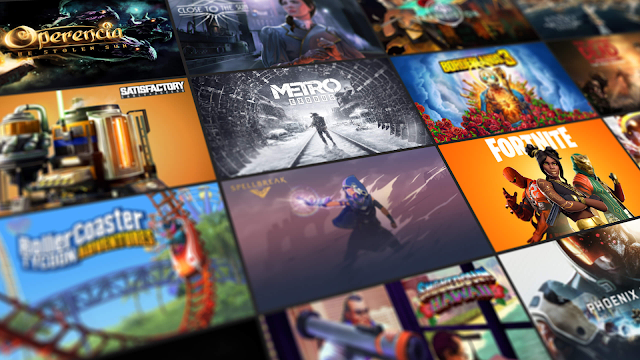Epic Games: The Journey of Success and Innovations
Founded in 1991 by Tim Sweeney, Epic Games has grown into one of the most influential names in the gaming industry. With its groundbreaking technologies, popular game titles, and revolutionary distribution strategies, Epic Games has reshaped the gaming landscape. In this article, we will explore the key milestones, innovations, and strategies that define Epic Games' success.
Humble Beginnings as Potomac Computer Systems
Epic Games began as Potomac Computer Systems, a small startup in Tim Sweeney’s parents’ basement in Maryland. The company released its first game, ZZT, in 1991, which gained moderate success due to its innovative level editor.
This early period laid the foundation for Epic Games' focus on game development tools and user empowerment, which would later become a hallmark of its success.
The Unreal Engine: A Technological Revolution
One of Epic Games’ most significant contributions to the industry is the Unreal Engine, launched in 1998 alongside the first-person shooter Unreal.
Key Features of Unreal Engine:
- Scalable graphics rendering for high-quality visuals.
- Support for a wide range of platforms, from PC to consoles and mobile.
- Continuous updates, with Unreal Engine 5 setting a new benchmark for real-time rendering and photorealistic graphics.
The Unreal Engine has become a cornerstone for developers, powering iconic titles such as Fortnite, Gears of War, and even non-gaming applications in film and architecture.
Fortnite: A Global Phenomenon
Launched in 2017, Fortnite skyrocketed Epic Games into global fame, evolving from a modest co-op survival game to a battle royale juggernaut.
Factors Behind Fortnite’s Success:
- Free-to-play model: Attracted a massive player base.
- Cross-platform play: Allowed players to connect across PC, consoles, and mobile devices.
- Frequent updates and events: In-game concerts featuring artists like Travis Scott and Ariana Grande created unique experiences.
- Vibrant esports scene: The Fortnite World Cup offered millions in prize money, cementing its place in competitive gaming.
With over 400 million registered players globally, Fortnite continues to be a dominant force in the industry.
Epic Games Store: A Distribution Game-Changer
In 2018, Epic Games launched the Epic Games Store, aiming to challenge the dominance of Steam.
Key Strategies of the Epic Games Store:
- Revenue-sharing model: Offering developers an 88/12 split, compared to Steam’s 70/30 model.
- Free games program: Weekly giveaways of popular titles, attracting millions of users.
- Exclusive titles: Securing exclusivity deals with major developers for games like Borderlands 3 and Metro Exodus.
This bold move disrupted the digital distribution market, giving developers and gamers more options.
Epic's Legal Battle with Apple
In 2020, Epic Games made headlines by suing Apple over its App Store policies, accusing the tech giant of monopolistic practices. The case began when Epic implemented a direct payment system in Fortnite on iOS, bypassing Apple’s 30% commission.
Implications of the Legal Battle:
- Highlighted the growing debate over app store economics.
- Sparked discussions about developer rights and revenue sharing.
- Positioned Epic Games as a champion for industry-wide change.
Although the court ruling was mixed, it underscored Epic’s willingness to challenge industry norms.
Acquisitions and Expansions
Epic Games has strategically expanded its portfolio through acquisitions and partnerships.
Key Acquisitions:
- Psyonix (2019): Developers of Rocket League.
- Quixel (2019): A leading provider of photorealistic 3D assets.
- Harmonix (2021): Known for Rock Band and Dance Central.
These acquisitions reflect Epic’s ambition to dominate not only game development but also content creation and immersive experiences.
Unreal Engine Beyond Gaming
Epic Games’ impact extends beyond gaming. The Unreal Engine has been widely adopted in industries like film, television, and architecture.
Notable Uses:
- The Mandalorian: Unreal Engine powered real-time virtual sets.
- Automotive design: Companies like BMW use Unreal for virtual prototypes.
- Virtual concerts and metaverse events: Expanding entertainment possibilities.
This diversification has positioned Epic Games as a leader in both interactive entertainment and cutting-edge technology.
Conclusion: A Legacy of Innovation
From its early days to its current status as a global powerhouse, Epic Games has consistently pushed boundaries. Whether through the Unreal Engine, Fortnite, or the Epic Games Store, the company has demonstrated a commitment to innovation, player engagement, and industry disruption.
As the gaming world looks ahead to the future of the metaverse, virtual reality, and blockchain gaming, Epic Games is well-poised to remain at the forefront of these advancements.
SEO Keywords:
- Epic Games success story
- Unreal Engine innovations
- Fortnite global impact
- Epic Games Store exclusives
- Epic vs Apple lawsuit
- Tim Sweeney Epic Games
- Future of Epic Games
- Epic Games acquisitions
- Unreal Engine 5 features
- Gaming industry leaders
This analysis showcases how Epic Games has transformed the gaming industry and continues to shape its future.



